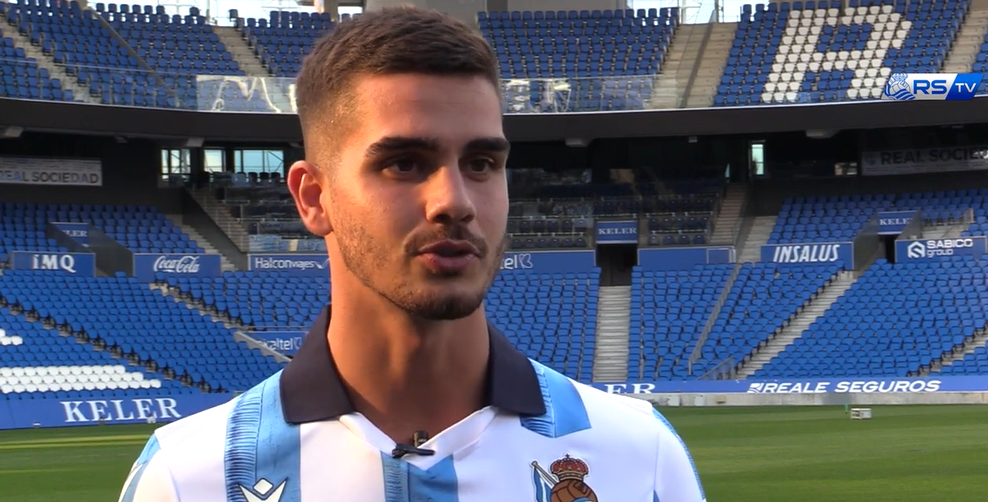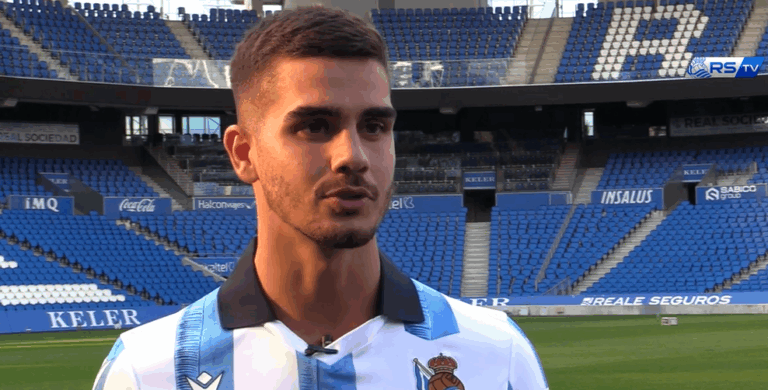Maria Rodrigues was at the epicenter of a terrible online storm in recent weeks, which she neither started nor anticipated. She should have been enjoying the closeness and happiness of being married to Portuguese striker André Silva, whom she married in June 2025. Instead, she was delicately handling a worldwide misunderstanding while lamenting a loss that wasn’t hers.
According to reports, Liverpool forward Diogo Jota’s brother André Silva also died in the same car accident that claimed his life in early July. But because of the striking resemblance of that name to her husband’s, Maria’s social media was inundated with misplaced condolences. According to all accounts, the digital chaos was intensely emotional but unintentional.
Maria provided a remarkably calm explanation on Instagram. She wrote with compassion rather than defensiveness, “I want to clarify that this information is not about my husband, André Silva, as there seems to have been some confusion regarding the recent devastating news.” Her message was incredibly respectful and clear, and she demonstrated exceptional emotional intelligence under duress.
Andre Silva Biography and Personal Profile
| Attribute | Detail |
|---|---|
| Full Name | André Miguel Valente da Silva |
| Date of Birth | November 6, 1995 |
| Place of Birth | Baguim do Monte, Portugal |
| Height | 1.85 m (6 ft 1 in) |
| Position | Forward |
| Current Club | RB Leipzig |
| National Team | Portugal |
| International Caps | 53 |
| Marital Status | Married |
| Spouse | Maria Rodrigues |
| Marriage Date | June 2025 |
| Notable Achievements | Played for FC Porto, AC Milan, Sevilla, Eintracht Frankfurt, RB Leipzig |
| Verified Source | Goal.com |

This was not just a case of misidentification. It brought to light how football players’ and their families’ private lives are frequently obscured by the sport’s worldwide attention. This experience catapulted Maria, a professional model with NXT Management, into unwelcome celebrity. Her face was featured in news feeds due to a tragic coincidence that left many internet users perplexed and emotionally stirred, rather than because of her wedding or career.
The public’s interest in football players’ personal lives has grown. Whether it’s Antonela Roccuzzo’s understated elegance or Georgina Rodríguez’s extravagant lifestyle, these women frequently attract both admiration and criticism. Despite being new to the spotlight, Maria Rodrigues handled the matter with remarkable poise and clarity, serving as a reminder to onlookers that every public person is a very private individual dealing with their own difficulties.
The incident was emotionally upsetting for André Silva, who used to play with Diogo Jota for the Portuguese national team and shared a locker room with him at FC Porto. They had shared memories both on and off the field, and their careers had grown together. Silva lost a friend and former teammate even though he was not the victim; this subtle fact is easily overlooked in the haste to make connections on social media.
Maria and André respectfully distinguished between pity and false information by speaking out about the situation. The episode also raised a more profound query: How can fans and media organizations be more watchful during times of widespread sorrow? In a time when speed is frequently more important than accuracy, the Silva-Rodrigues mix-up serves as a warning about the psychological toll that viral mistakes can take.
Maria changed the tone completely and fixed the story with well-timed communication. Her kind letter did more than just make things clear; it sparked compassion and shifted public opinion in favor of Diogo Jota and his brother’s family, who were the true victims. It was a very creative way to handle digital identity, especially for someone who had just been connected to the highly publicized world of professional sports.
Maria became an unexpected symbol of emotional intelligence in contemporary football because of her remarkable communication skills and her ability to remain composed under scrutiny. Not only was her poise in the face of chaos admirable, but it was also enlightening. Football players’ partners have started to exert more agency over public discourse in recent years. Maria’s composed yet sincere remarks were widely reported in the UK, Germany, and Spain, reaching far beyond Portugal.
This story had wider ramifications in terms of identity and public opinion. It demonstrated how athletes and their families are susceptible to unintended consequences of fame, misguided grief, and gossip. Maria’s experience highlights the pressing need for improved safeguards for identity clarity and fact verification in media and platforms.
One cannot ignore how intimate events, such as a wedding, can be unpredictably eclipsed, even after the dust has settled. However, Maria and André are subtly taking back their story, refusing to let grief dictate their newlywed lives. Pictures from their June wedding are still up on their profiles, serving as a subdued yet potent reminder that love is more resilient than people realize.
Players with calm, astute partners add a special value to medium-sized teams like RB Leipzig. André Silva’s reputation was unexpectedly elevated by Maria’s dignified response, both as a forward with 53 international caps and as a person surrounded by strong, considerate friends. Even though it’s frequently unsaid, this type of support network can be especially helpful for athletes in maintaining mental clarity and performance focus.
Since Maria’s post, the public’s responses have significantly improved, moving from bewilderment to empathy. Her sincerity has been praised by fans on a variety of forums, and commentators have praised her for her ability to calmly diffuse the situation. Her subtle correction was incredibly effective in bringing accuracy back without adding to the drama in a media culture that frequently exaggerates mistakes.
Maria Rodrigues transformed from a newlywed or model married to a football player to a gentle yet firm voice of reason who corrected false information with tact and compassion as a result of this experience. Her response might serve as a model for how to respond to public blunders with dignity as stories fade and news cycles change.


